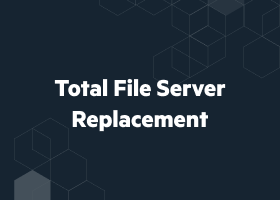Harness the Cloud File Sharing Server Revolution
What Is a File Sharing Server?
A file sharing server is a central server in a computer network used to store and manage data files. Many, if not most, modern file sharing servers are cloud file sharing servers, as opposed to file sharing servers, which usually refer to on-premises systems. File sharing servers and cloud file sharing servers provide users with access to a central storage space from which they can:
- Access and upload files remotely
- Backup files
- Save files
- Share information
With file sharing and cloud file sharing servers, users can edit files and those changes will be saved centrally. This way, authorized users can access the latest updates to files or folders.
File sharing server administrators and cloud file sharing server administrators can establish and enforce strict rules to control file access. These rules provide governance related to how files can be:
- Added
- Closed
- Created
- Deleted
- Edited
- Opened
- Viewed

File sharing server administrators and cloud file sharing server administrators can create groups and apply these rules to groups as well as individuals.
Features such as Conflict resolution, file locking and permission management in File sharing and Cloud File sharing servers help prevent conflict between multiple users while accessing files. These include:
- Conflict resolution—maintains data integrity by preventing and managing data conflicts
- File locking—safeguards that prevent more than one user from editing a file at the same time
- Permission management—controls access rights
The following are several advantages and disadvantages of file sharing servers and cloud file sharing servers.
| Advantages of file sharing servers and cloud file sharing servers | Disadvantages of file sharing servers and cloud file sharing servers |
| Can be easily extended and customized Offer high performanceProvide robust access controls to secure data and maintain data integrity Scalable (cloud file sharing servers)Support for high-capacity use cases | Needs IT admin supportCan create vulnerabilities if proper security measures are implementedRequires planning to scale capacity (i.e., file sharing servers, not cloud file sharing servers) |
What Is the Difference Between File Share and File Server?
| File Share | File Server |
| The File Share resource type, available for use in Microsoft Windows Server 2003, manages file shares that can be accessed by users (i.e., applications and clients) through a network path. | A file server is a computer system that stores and manages files, making them accessible to other systems on the same network. A file sharing server enables users to share files over a network rather than having to transfer files physically. |
How FTP Servers Differ from File Servers
File sharing servers and cloud file servers have the capabilities and capacity to store, transfer, and manage files. FTP servers require file servers in order to function. FTP (file transfer protocol) is used to transfer files, and file server technology is used for storage and management.
Which Option is Right for Your Business?
Selecting the right file sharing server or cloud file sharing server requires taking time to identify the organization’s needs and assessing how well a solution’s feature set aligns with requirements. In addition to budget parameters, user count and storage size, the following are several considerations when deciding which file sharing server or cloud file sharing server is the best fit.
Cloud file sharing server or file sharing server (on-premises)
While cloud file sharing servers have become more widely used, on-premise file sharing servers are still used and continue to play an important role in enterprise environments. Depending on an organization’s operational, and security requirements, an on-premise file sharing server can be a better choice than a cloud file sharing server.
On-premises file sharing server considerations
- Administration is handled internally.
- Costs are initially cheaper, but can increase precipitously as capacity increases.
- Data is entirely held by the organization.
- Data protection is completely the responsibility of the organization.
- Data sharing is fast with on-premise storage, since data is stored locally.
- An upfront capital investment is required.
Cloud file sharing server considerations
- Costs are predictable.
- Data is stored on the remote servers of the service providers.
- Data protection is mostly the service provider’s responsibility.
- Latency can slow access to data.
- Upfront investment is minimal, with no capital expenditures required.
- Minimal internal administrative support is required.
Data management capabilities for file sharing server or cloud file sharing server
The two data management capabilities considered to be important for enterprise capabilities for file sharing server or cloud file sharing server solutions are data classification tools and legal hold support. Data classification capabilities allow custom policies to be created or provide pre-built classifications.
Legal hold capabilities support the retention of content related to legal issues and secure files created by a specific user or in a particular location.
Integrations and APIs
Depending on what data is stored in a file sharing server or cloud file sharing solution, integrations with third-party apps and APIs can help determine which solution is best. For organizations that share data with systems and applications, APIs and integrations are of paramount importance.
Management capabilities for file sharing server or cloud file sharing server
Different file sharing server or cloud file sharing solutions offer a range of management capabilities. Two important ones to consider are role-based administration and unified permission capabilities. Role-based administration capabilities allow admins to delegate tasks, such as folder and file permissioning, to authorized users. Unified permission capabilities provide the ability to manage folder, group, and user access to all data regardless of source.
Multi-platform support
When selecting a file sharing server or cloud file sharing solution, consider what platforms it needs to support. Be sure to include mobile platforms as well as traditional IT.
Security and privacy requirements
Protecting sensitive data is a top priority for all organizations and factors into deciding which type of file sharing server or cloud file sharing solution will meet their requirements. For many organizations, compliance is also an important consideration when assessing security for a file sharing server or cloud file sharing solution. Several security features that are included in robust file sharing server or cloud file sharing solutions are:
- Data encryption in transit and at rest
- Granular permissioning that allows access admins to grant or remove group and user-level permissions at the folder and sub-folder levels
- IP address controls that limit access to only approved users from approved IP addresses
- Privacy rules support, such as automating DSAR/SAR requests, cookie consent management, and privacy assessments
- Threat detection capabilities to identify unusual behavior and possible malware
- Usage audit reports that cover all user and file activity
- Validated sharing to prevent unauthorized file transfers
Storage capacity needs for file sharing server or cloud file sharing server
File sharing servers have a fixed storage capacity and require the deployment of additional hardware as capacity is reached. Cloud file sharing servers have limitless storage capacity as it can be added on demand by service providers.
File Sharing Servers and Cloud File Sharing Servers Deliver
Regardless of whether an organization chooses to use a file sharing server or cloud file sharing solution, both have value to offer. As with any solution, organizations are advised to take time to dig into requirements and find a solution that strikes the right balance between usability, security, and performance.
Egnyte has experts ready to answer your questions. For more than a decade, Egnyte has helped more than 17,000+ customers with millions of users worldwide.
Last Updated: 23rd February, 2024


